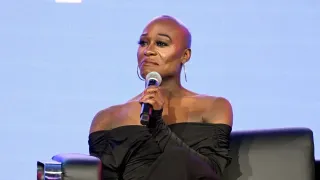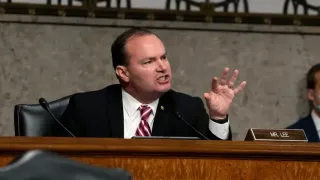
3 hours ago
French President Emmanuel Macron’s Legal Team Hired Investigators Before Suing Candace Owens, Court Filing Shows
READ TIME: 3 MIN.
Attorneys for French President Emmanuel Macron and First Lady Brigitte Macron retained professional investigators to research U.S. podcaster Candace Owens in the lead-up to a U.S. defamation lawsuit filed in Delaware, according to public court records and follow-up reporting published Tuesday. The court complaint, filed on July 23, 2025, details Owens’s statements about Brigitte Macron and outlines the Macrons’ assertion that those statements were false and harmful; reporting notes that investigators reviewed Owens’s public remarks and connections to far-right figures across multiple countries before the suit was initiated.
The lawsuit, brought by Emmanuel and Brigitte Macron against Owens, Candace Owens LLC, and GeorgeTom, Inc., was filed in the Superior Court of the State of Delaware and demands a jury trial. In the filing, the Macrons allege that Owens escalated her claims via an eight-part podcast series titled “Becoming Brigitte,” following a retraction demand issued by their representatives. Subsequent coverage states that investigators compiled and analyzed Owens’s public statements and social ties relevant to the defamation claims before the case was brought.
At the core of the complaint are repeated statements by Owens concerning Brigitte Macron’s gender, which the filing describes as false assertions used to generate attention and revenue. The complaint references Owens’s pledge to “stake entire professional reputation” on the claim, which the plaintiffs argue has no basis in fact and has continued despite prior efforts in France to address similar rumors. The reporting reiterates that the investigator review focused on contextualizing Owens’s remarks and mapping her relationships with far-right figures in France, Britain, and the United States as part of a broader pattern alleged in the complaint.
While the Delaware case proceeds, the episode resonates with LGBTQ+ audiences because it spotlights how public figures’ gender-based disinformation can cause harm well beyond the individuals targeted. Anti-transgender smears and insinuations—often framed as “questions” about a person’s gender—are a well-documented tactic used to demean and delegitimize people, including transgender people and cisgender women who become targets of gender-based harassment. In this case, the Macrons’ complaint asserts that Owens’s statements are defamatory, and the decision to engage investigators underscores the seriousness with which the couple approached documenting the public record prior to litigation.
The use of professional investigators is not unusual in complex defamation matters, particularly where a plaintiff aims to establish a pattern of statements, the scope of publication, and potential malice elements under U.S. law. In this instance, the reported review encompassed Owens’s public content and affiliations cited in the complaint narrative.
As the Delaware case advances, official filings and court schedules will determine next steps, including potential motions practice and discovery, if the case proceeds on the merits. Representatives for Owens and for the Macrons did not immediately appear in the court filing’s public docket as having provided public statements beyond the complaint; any formal responses will be captured in subsequent docket entries or public statements from counsel.
Readers can review the complaint, filed and timestamped on July 23, 2025, which lays out the factual and legal contours as asserted by the Macrons and which will frame the litigation going forward. Follow-up reporting highlights the role of investigative research in preparing the case and situates the lawsuit within the broader media and political conversation surrounding misinformation, online harassment, and cross-border ramifications of U.S.-based commentary.






